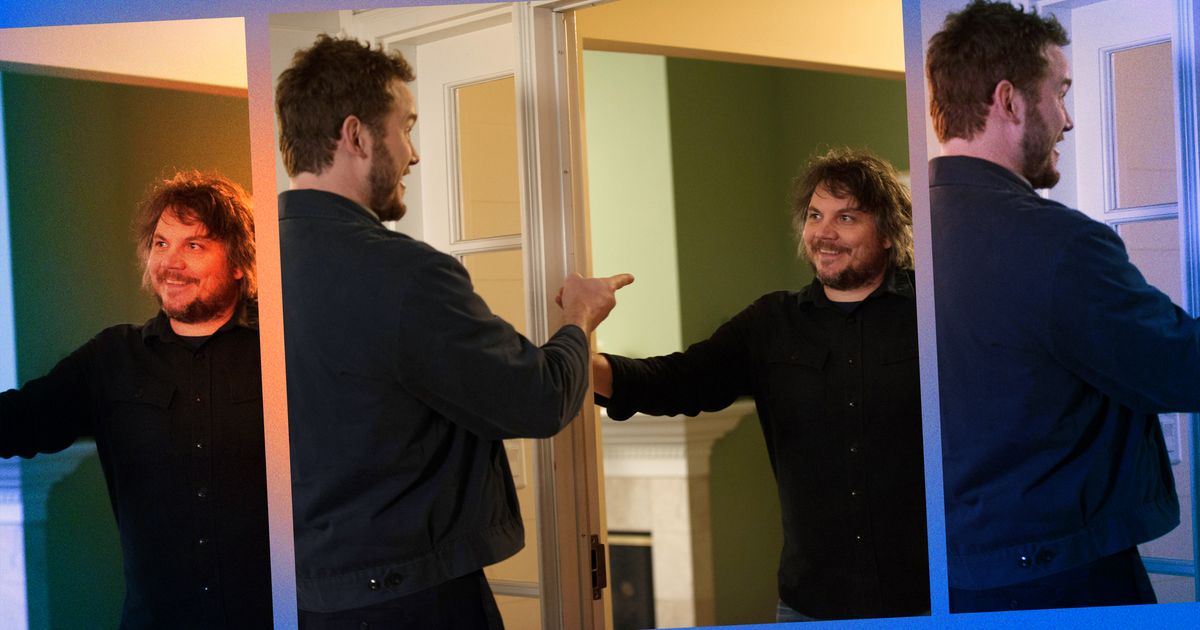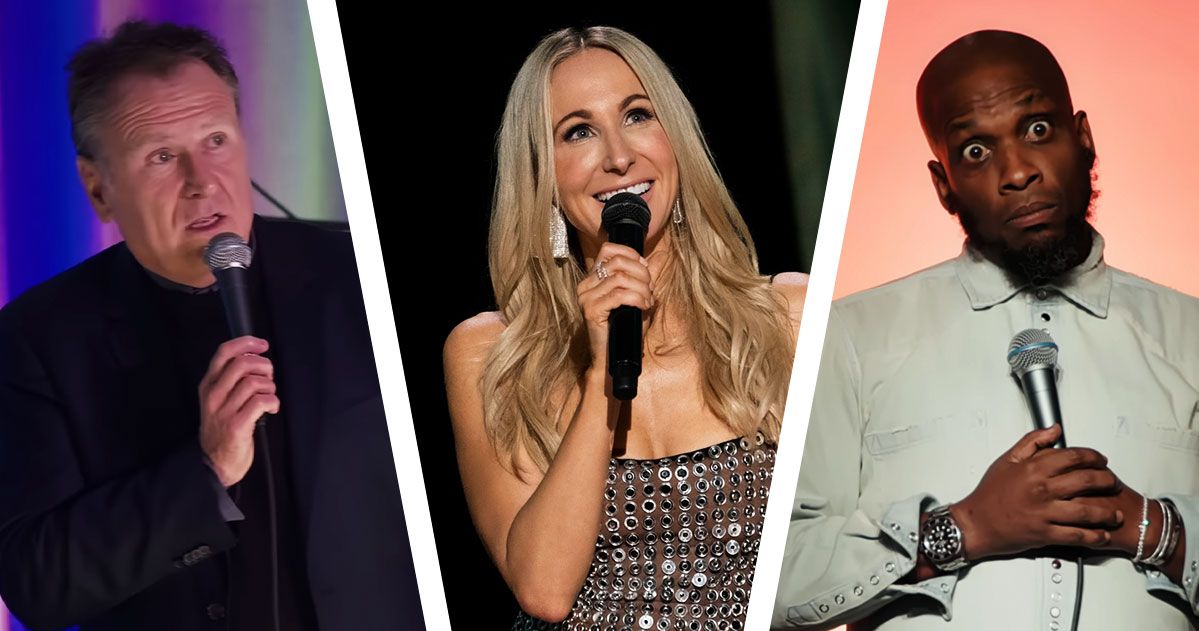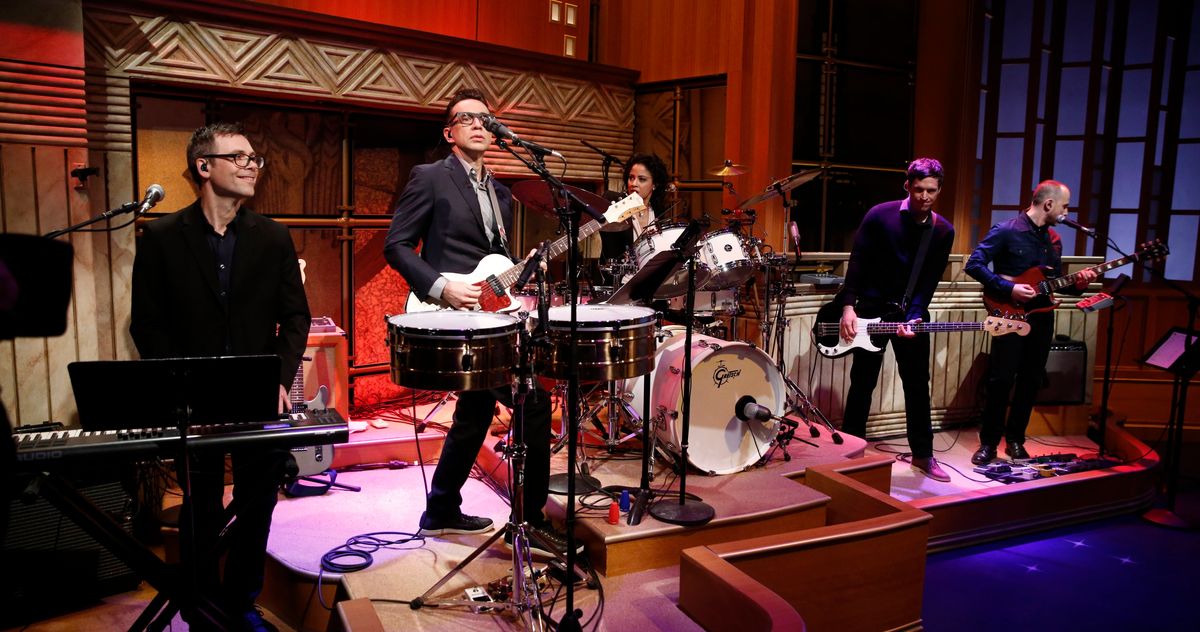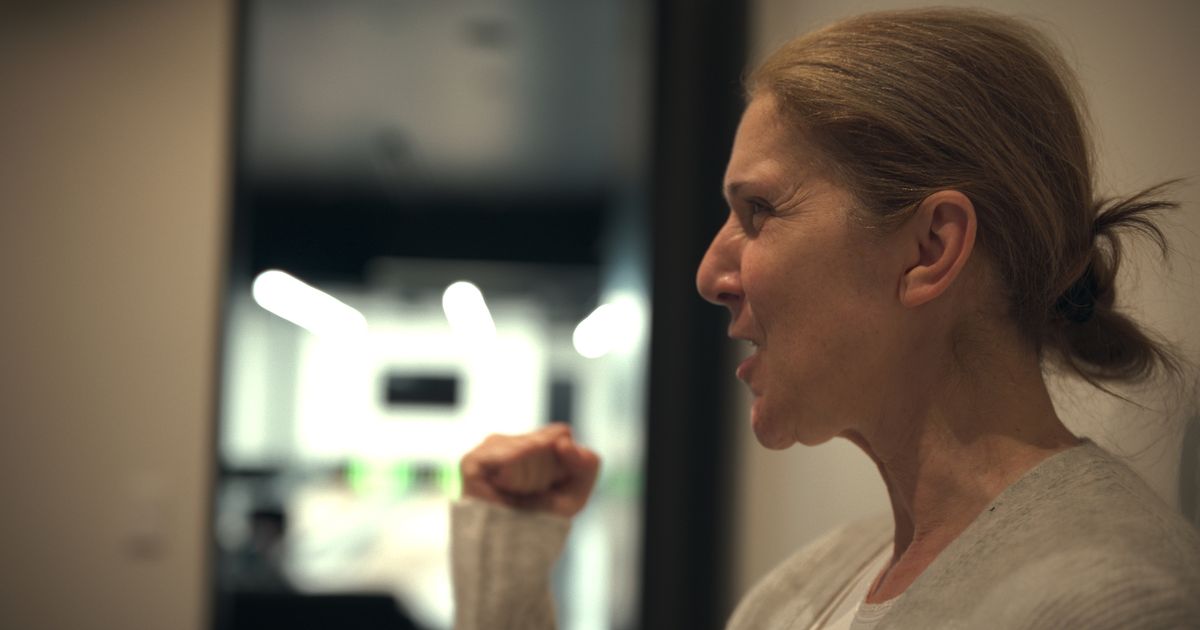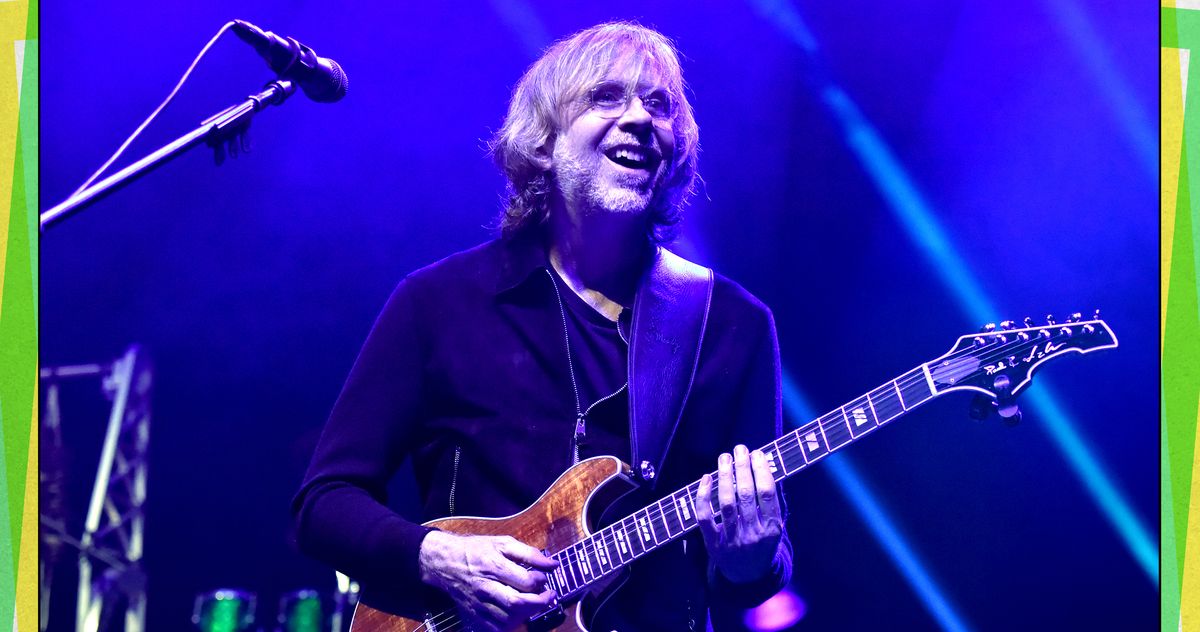“When I discussed this with the writers, they said they kept talking about Scott Tanner in the writers’ room like a ‘Jeff Tweedy–type character’ or a ‘Midwestern washed-up rock star.’”
Photo-Illustration: Vulture; Photo: Colleen Hayes/NBCU Photo Bank/NBCUniversal via Getty Images
When Parks and Recreation reached the tail end of its sixth season, tensions had never been higher between the rival cities of Pawnee and Eagleton. Years of bureaucratic mismanagement had exacerbated Eagleton’s financial issues — the only way to get out of debt was to reabsorb into Pawnee, a jarring culture clash that had citizens hurling proverbial Paunch Burgers and palm trees at one another in protest. But Pawnee’s parks department had an inspired idea for solidarity: They’d throw a Unity Concert to officially unite the two cities in every sense of the term and get some notable performers to sweeten the deal for its citizens. Andy (Chris Pratt) has a dream headliner list: the Beatles, “Bob Dylan’s friends,” Led Zeppelin, and … Land Ho! The rockers are the stuff of Pawnee legend, who, as Leslie (Amy Poehler) notes, will never get back together despite unrelenting demand since their break-up. “Their lead singer split ten years ago,” she explains. “He titled their last album We’ll Never Reunite.” But it’s time for a Hail Mary; the original headliner backed out. How are they possibly going to get these elusive geniuses onstage for one night only? “Same way I got a perfect score on the SATs,” Andy declares. “A broken Scantron machine.”
Land Ho!, indeed, reunites for the Unity Concert, with Jeff Tweedy, as lead singer Scott Tanner, playing the part of an approachable front man who’s able to get behind Leslie and Andy’s message for the sake of the community. Tweedy, best known for leading the band Wilco — which is currently on a summer tour — says he was cold-called about the opportunity when the show’s writers realized there were quite a few parallels between him and the character. He wound up appearing in two episodes, and he continues to be proud that he was able to “fit in and do at least a passable job in a different environment” as a non-actor. “Saying ‘yes’ was the right decision and very gratifying,” he now reflects.
Was Parks and Recreation appointment viewing in your household before you were approached with this idea?
For my wife it was. I don’t have a whole lot of appointment viewing with my television habits, but I enjoyed the show whenever it was playing. I did see it with my wife quite frequently, but I wasn’t as versed on Pawnee as she was. I got to be honest. I’ve just been sworn in.
I find your appearance so amusing, because you had to be sold about not only the character, but also this slightly ludicrous idea of a concert that celebrates a merger of two random towns in the middle of Indiana. What was the show’s pitch to you, and who was the messenger?
I got word through my management that I was being asked if I wanted to be on Parks and Recreation and play sort of a semi-autobiographical character. When I discussed this with the writers, they said they kept talking about Scott Tanner in the writers’ room like a “Jeff Tweedy–type character” or a “Midwestern washed-up rock star.” And somebody said, “Well, why don’t we just go ahead and ask Jeff?”
Oh, how lovely.
That was pretty funny for them to admit. Listen, I know a lot of people who were musicians and contemporaries of mine who have given up the life of traveling around in a van and stuff like that. I wouldn’t say I know a lot of washed-up rock stars, but I do know a lot of musicians who have turned the page and started a different chapter in their lives.
At the time, I was immediately going to say “no,” because my wife was just beginning the process of getting diagnosed with cancer and starting her treatment. I didn’t want to leave at that particular moment, but she insisted. She was adamant that I couldn’t say “no” because she loved the show so much and wanted me to be a part of it. That was the context for me — I was hesitant to be gone at all at the moment, but she pushed me to accept.
How confident were you in your acting abilities?
I wasn’t confident at all, but I assumed the show knew what it was doing. I also wasn’t being asked to cry or do something outlandish. It wasn’t presented to me like it was going to be a stretch as an actor.
Did you name the band?
Yes, they let me come up with the name. The writers had a placeholder name that I can’t remember, but I asked if I could use the name Land Ho!, because I thought it was funny. I insisted upon the exclamation point because I think that’s what a band would have done. I have potential band names swirling around in my head all the time. That’s one of the crimes of being in a band for so long: You don’t get to use any of them.
What’s your favorite swirling in your head right now?
Triple Rainbow.
Your character starts to reconsider his anti-reunion stance when Andy tells him how Mouse Rat, his local band, always covers Land Ho!’s songs because crowds go crazy for them. What would you consider to be the most impressive Wilco cover?
Oh, gosh. There were a fair amount of them done all at once a few years ago. One of the British magazines, Uncut, did a CD of more than a dozen Wilco covers. I liked Cate Le Bon’s version of “Company in My Back” quite a bit — so much so that I wanted to work with her after hearing it.
Did the full scale of the Unity Concert’s outdoor venue surprise you?
I had no idea what to expect. I guess I understood that there’s a pretty big budget for a successful television show, but it also wasn’t that different from walking around the grounds of a music festival. It was much more contained than the festivals we play. I was just hoping that I could get it done and not screw up.
Was there a weird type of camaraderie established with your fellow performers? Were you shooting the shit with Yo La Tengo and the Decemberists about this moment in sitcom history?
I remember hanging out with Yo La Tengo quite a bit. I’ve been friends with them for a long time. All of the bands weren’t there at the same time — they were moving people around pretty frequently. It was such a long day that everybody kind of disappeared into their trailers to relax. When I was on the previous episode, which was filmed a couple of weeks before the concert, I got to know and became good friends with Nick Offerman. So I spent a lot of time hanging out with him at the concert, because we hit it off on the previous shoot. We’re both from smaller towns of Illinois, and we had a lot in common from our cultural backgrounds.
The song you perform as Land Ho!, “Pickled Ginger,” is heard briefly in the episode before it got released over a year later as a proper Wilco song. Why was that one deemed the best fit for the concert?
I thought it would be a fun song to play, and it was something that the band could perform, since they were made up of two members of the Wilco road crew at the time. They’re both very sweet people who I’m still good friends with. So it was something I could rehearse with them a little bit beforehand. But also it’s a fun riff that sounds instantly cool even if you only hear 15 seconds of it, which is true for the episode.
There’s a day-to-night transition during your set. How long did you play for?
It didn’t go on and on and on. I believe we played for a full hour, and then there were some different shots where we had to be in the background. My overall memory of the day was just really enjoyable. It made me want to do more funny things. Every time I’ve been on any kind of set, such as Portlandia, I’ve left wanting to do more of it. I haven’t been a part of any set that’s falling apart or rancorous or angry, but I’m sure those exist. I’ve had pretty good luck.
You have the privilege of being one of the musicians who performed “5,000 Candles in the Wind” for the dearly departed Li’l Sebastian. Where does that rank among other all-star jams you’ve participated in?
It was a spectacle. It was a lot more organized, to be honest, than most onstage tributes I’ve been a part of. A lot of times when you have that many musicians onstage, it’s kind of an impromptu jam or something, and nobody knows exactly who’s supposed to be playing. So it was more organized in the sense that there were very specific roles being given to everybody for a song about a mini-horse. It was a beautiful moment and oddly touching for a lot of people. It’s such a silly thing, but it actually has a real emotional resonance.
The show referenced several ’90s-era rock bands throughout its run, such as Pearl Jam and Neutral Milk Hotel. Do you like to think Wilco somehow exists in the Pawnee universe?
I’m happy either way. It seems likely that Wilco would exist in that universe, but maybe it’s an alternate universe where I ended up being Scott Tanner and having Land Ho!, and that’s enough for me.
After the episode aired, did you feel there was a shift in your public perception?
I wasn’t being asked to do more comedic parts or anything like that. I mean, that has happened, but I don’t think it was a result of Parks and Recreation. The one thing that definitely occurred was I would get people yelling “Scott Tanner!” to me a lot. There are still genuinely excited people who want to meet me because of the show and not because of anything I’ve done in my music career. I’m a peripheral character in a universe that people have a deep affinity for. So that’s really strange to witness, but it happens. There are still fans that come up at book signings and say, “Hey man, I love Land Ho! Are they getting back together again? I hope it happens in my lifetime.”
A running joke throughout your episodes is how the parks department could try to get Bob Dylan’s friends to play the concert because “maybe they could get Bob Dylan to come.” Wilco toured with Bob about a decade ago. Would you consider yourself a friend of Bob?
As much as I want to say “yes,” the honest answer is no. But I’m happy just knowing that Bob knows who I am.
Let’s say you were in charge of a Unity Concert and had the power to reunite any band to headline it. Who would you choose?
That really ties my hands. Do they all have to be alive?
I’ll let you decide.
I’d say the Beastie Boys would be really nice to be able to see again.
Based on your observations of the music industry, is there a seemingly retired and impenetrable band that you think has a good chance of reversing their reunion stance in the future?
That’s a tough one to say. A band like R.E.M., for instance, seem pretty adamant about staying retired, but they’re all still friends, which is the weirdest part of it. Talking Heads have almost kind of gotten back together just to do some press for Stop Making Sense, but not to play shows. I think a Talking Heads tour would be extremely exciting.
You released a new song under the Scott Tanner name, “Cold Water,” in 2021. Why was it important for you to keep the character alive all those years later?
I figured, Why not? I was asked if I would contribute something as another Land Ho! or Scott Tanner song, and I thought it was a fun idea to add another part to this fictitious life of mine. I had some songs that I thought might fit the bill. It’s funny — bands are sort of fictitious to begin with. You give a name to a bunch of guys together in a van, and then everybody starts calling you that. It’s an agreed-upon kind of illusion.
In the spirit of unity, is there any scenario that would compel you to reunite Uncle Tupelo?
I would never say never, but it doesn’t seem likely. I guess it’s not much of a stretch from Scott Tanner.




